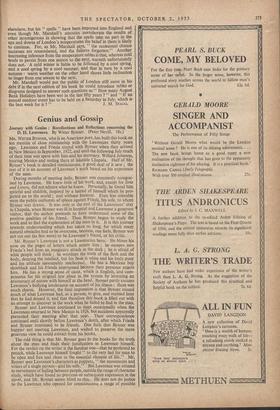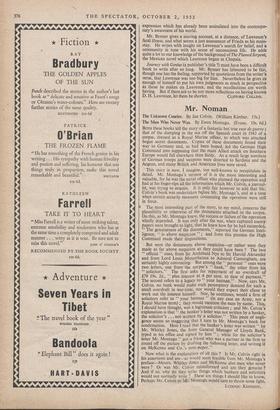Genius and Gossip
Journey with Genius : Recollections and Reflections concerning the D. IL Lawrences.• By Witter Bynner. (Peter Nevin. 18s.) MR. WITTER BYNNER, who is an American poet, has built this book on ten months of close relationship with the Lawrences thirty years ago. Lawrence and Frieda stayed with Bynner when they arrived in New Mexico in September, 1922, and until the following July much of their time was spent with him and his secretary, Willard Johnson, touring Mexico and resting there at lakeside Chapala. Half of Mr. Bynner's book is detailed reminiscence, a good deal of it new ; the rest of it is an account of Lawrence's work based on his experience of the man.
During months of meeting daily, Bynner was constantly antagon- ised by Lawrence. He knew little of his work, and, except for Sons and Lovers, did not admire what he knew. Personally, he found him spiteful and childish, inspired by a hatred of himself which he pro- jected on to the world ; and without humour. Even less tolerable were the public outbursts of spleen against Frieda, his wife, to whom Bynner was drawn. It was only at the end of the Lawrences' stay in Chapala, when Bynner was ill in hospital and Lawrence a generous visitor, that the author pretends to have understood some of the positive qualities of his friend. Then Bynner began to study the work and to find the explanation of the man in it. It is this journey towards understanding which has taken so long, for which many natural obstacles had to be overcome, because, one feels, Bynner was not cut out (as few were) to be Lawrence's friend, or his critic.
Mr. Bynner's Lawrence is not a Lawrencian hero. He blows his nose on the pages of letters which annoy him ; he escapes into Frieda's bed from an imaginary attack in the dark ; he is afraid of what people will think • he worships the truth of the flesh and the body, denying the intellect, but his flesh is white and his body puny and his attitude inescapably intellectual. He has a Mexican boy shoeblack and his friends imprisoned because their presence angers him. He has a strong sense of caste, which is English, and com- pensates for his original low place in the system by inventing an aristocracy of nature with himself at the head. Bynner partly excuses Lawrence's bullying intolerance on account of his illness ; there was much charm. However, the final impression is that Bynner missed much of what Lawrence had, as a person, to give, and realised later that he had missed it, and, that therefore this book is filled out with an attempt to discover in the work what he failed to find in the man.
Bynner and Lawrence continued to meet occasionally when the Lawrences returned to New Mexico in 1924, but accidents apparently prevented their meeting after that year. Their correspondence continued until shortly before Lawrence's death, after which Frieda and Bynner continued to be friends. One feels that Bynner was happier not meeting Lawrence, and wished to preserve the more generous view he could extract from his books.
The odd thing is that Mr. Bynner goes to the books for the truth about the man and finds their justification in Lawrence himself. For the verdict on the writer is the familiar one—that he-preferred to preach, while Lawrence himself fought " to the very last for man to be open and free and clean in the essential element of life." Mr. Bynner sees Lawrence's characters as puppets, " the movements and voices of a single person—And his wife." But Lawrence was attuned. to movements of feeling between people, outside the range of character study, which have found no previous or subsequent expression in the novel, and Mr. Bynner seems blind to this. He does not do justice to the Lawrence who opened for consciousness a range of possible expression which has already been assimilated into the contempo- rary's awareness of his world.
Mr. Bynner gives a moving account, at a distance, of Lawrence's fatal illness, and what seems a just assessment of Frieda as his main- stay. He writes with insight on Lawrence's search for belief, and a community in tune with his sense of unconscious life. He adds quite a lot to our knowledge of the background of The Plumed Serpent, the Mexican novel which Lawrence began in Chapala.
Journey with Genius (a publisher's title ?) must have been a difficult book to write after so long. Mr. Bynner has laboured to be fair, though one has the feeling, supported by quotations from the writer's verse, that Lawrence was too big for him. Nevertheless he gives us enough of himself to put his own judgments as much in perspective as those he makes on Lawrence, and the recollections are worth having. But if there are to be any more reflections on having known



















































 Previous page
Previous page